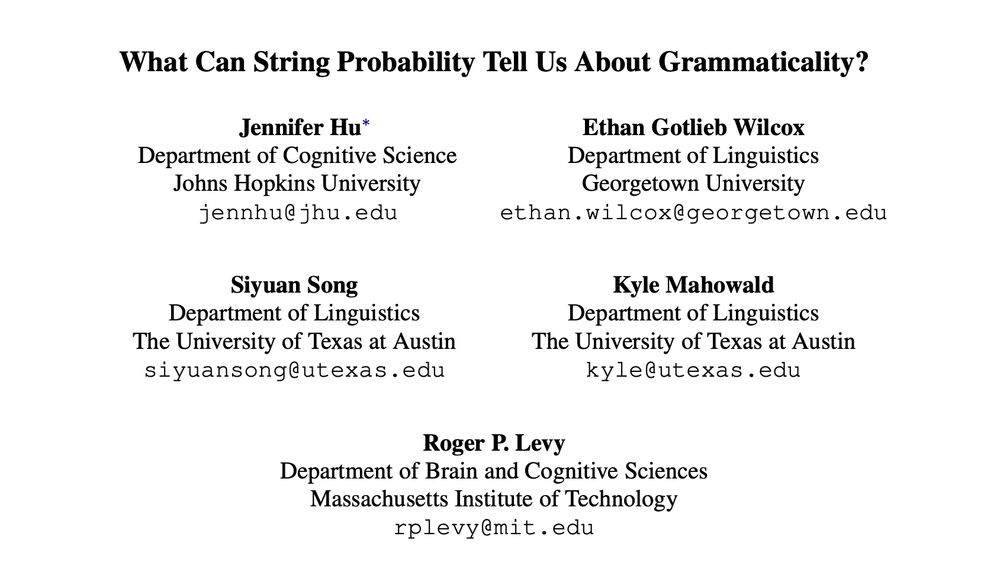jennhu.github.io
Preprint (pre-TACL version): arxiv.org/abs/2510.16227
10/10

Preprint (pre-TACL version): arxiv.org/abs/2510.16227
10/10
This connects to tensions btwn language generation/identification (e.g., openreview.net/forum?id=FGT...)
9/10
This connects to tensions btwn language generation/identification (e.g., openreview.net/forum?id=FGT...)
9/10
This overlap is to be expected if prob is influenced by factors other than gram. 7/10

This overlap is to be expected if prob is influenced by factors other than gram. 7/10
1. Correlation btwn the prob of string probs within minimal pairs
2. Correlation btwn LMs’ and humans’ deltas within minimal pairs
3. Poor separation btwn prob of unpaired grammatical and ungrammatical strings
6/10

1. Correlation btwn the prob of string probs within minimal pairs
2. Correlation btwn LMs’ and humans’ deltas within minimal pairs
3. Poor separation btwn prob of unpaired grammatical and ungrammatical strings
6/10
This phenomenon has previously been used to argue that probability is a bad tool for measuring grammatical knowledge -- but in fact, it follows directly from our framework! 5/10
This phenomenon has previously been used to argue that probability is a bad tool for measuring grammatical knowledge -- but in fact, it follows directly from our framework! 5/10
Good LMs have low P(g=0), so they prefer the grammatical string in the minimal pair.
But for non-minimal string pairs with different underlying messages, differences in P(m) can overwhelm even good LMs. 4/10
Good LMs have low P(g=0), so they prefer the grammatical string in the minimal pair.
But for non-minimal string pairs with different underlying messages, differences in P(m) can overwhelm even good LMs. 4/10
In our framework, the probability of a string comes from two latent variables: m, the message to be conveyed; and g, whether the message is realized grammatically.
Ungrammatical strings get probability mass when g=0: the message is not realized grammatically. 3/10
In our framework, the probability of a string comes from two latent variables: m, the message to be conveyed; and g, whether the message is realized grammatically.
Ungrammatical strings get probability mass when g=0: the message is not realized grammatically. 3/10
Our framework provides theoretical justification for the widespread practice of using *minimal pairs* to test what grammatical generalizations LMs have acquired. 2/10
Our framework provides theoretical justification for the widespread practice of using *minimal pairs* to test what grammatical generalizations LMs have acquired. 2/10
🗓️ Submit your 4-page paper (non-archival) by August 15!
4/4
🗓️ Submit your 4-page paper (non-archival) by August 15!
4/4
3/4
3/4
Cognitive science offers a rich body of theories and frameworks which can help answer these questions.
2/4
Cognitive science offers a rich body of theories and frameworks which can help answer these questions.
2/4
A huge thank you to my amazing collaborators Michael Lepori (@michael-lepori.bsky.social) & Michael Franke (@meanwhileina.bsky.social)!
(12/12)

A huge thank you to my amazing collaborators Michael Lepori (@michael-lepori.bsky.social) & Michael Franke (@meanwhileina.bsky.social)!
(12/12)

